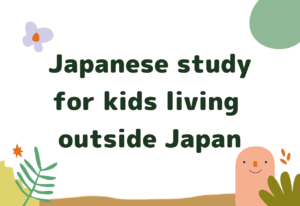As children are getting older, they would have many other things to enjoy, such as sports activities, and it might be difficult for Japanese language learning to compete with such “competitors”. You however would like to keep in mind that your kids might still enjoy something related to Japan even though they are not at all interested in the Japanese language.
In fact, your children would not find such things easily. Even so, it is always a good idea to give it a go, preparing things in their daily lives, which might attract their attention, such as hobbies, entertainments, etc. The actions should not be pushy, but simply be ready for the moment that the things get children’s interest.
By planting such “seeds” in their daily lives, it may become an opportunity for your children to come back to Japanese study in their future, even if they give up learning Japanese.
